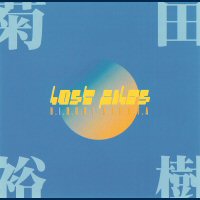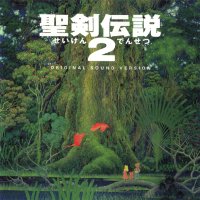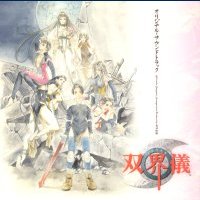The Pioneers: Hiroki Kikuta |
|
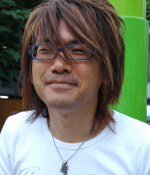
In the field of musical composition, where he is best known, Hiroki Kikuta is a full-fledged autodidact. His interest in becoming a songwriter was inspired at age ten by coming into contact with the progressive rock group Emerson, Lake and Palmer. He began writing his own songs for the acoustic guitar, but critical of his vocal abilities, he began focusing more intently on piano compositions. Inspired by Keith Emerson's use of MOOG synthesizers to achieve a unique synthetic sound, Kikuta purchased a YAMAHA SY-77 sequencer, by means of which he could experiment with any number of simulated musical instruments.
Hiroki Kikuta decided, while still a university student, to invest his creative energies in developing compositions using digital media, departing from his earlier dream of joining a rock band as a lead vocalist. This pivotal step enabled his later collaboration with Square, and was instrumental in pioneering his influence upon the game music industry in Japan. In other realms, Kikuta's evolution as an artist was remarkably diverse and inextricably interwoven with what would amount to a personal musical philosophy. As an undergraduate, the artist enrolled at the University of Kansai, Osaka, choosing an interdisciplinary degree in Religious Studies, Philosophy, and Cultural Anthropology. Graduating in 1984, in his early twenties, the artist found he was most compelled by the prospect of expressing his ideas through popular media, in a mode that transcended cultural boundries and societal norms.
Surprisingly, the celebrated game composer's first employment upon leaving school directly related neither to his academic work, nor to his self-taught development as a musician, but as an image illustrator for the manga "Raven." It is a popular convention among manga artists to dawn a pseudonym when penning their works. For instance, Kikuta's collaborator on a project for Byakuya Publishing called "The Ghost in Machine Head 2" was born Masanori Ota, but worked under the pen name of Masamune Shirow. Believing that he was at a special age, Kikuta took the name "Yuki 26" as a symbol of self-invention. Through the connections he made as a manga illustrator, Kikuta was hired for his first project as a music composer, scoring tracks for televised animation series, such as The Great Adventures of Robin Hood (ロビンフッドの大冒険 ) and The Legend of Princess Snow White (白雪姫の伝説).
SQUARE
Seeking a stable source of work in the nascent field of videogame development, Kikuta sent in an audition reel to Squaresoft in 1991. Portions of the demo tape are now available to fans on the self-published soundtrack entitled Lost Files. Based on the quality of his submissions, Kikuta was invited to interview with Square music creators Nobuo Uematsu and Kenji Ito. The composers behind the Final Fantasy and Seiken Densetsu series of games were impressed with the quality of work found on the demo, along with the breadth of experience and variety of opinions exhibited by the musician so early in his career. Soon afterward, he was hired to design sound effects for Ito's Super Famicom title Romancing SaGa. The quality of his work convinced Square that the artist should compose his own game soundtrack. What resulted was the score for Seiken Densetsu 2 (聖剣伝説). Released in English-language territories as Secret of Mana, the title was the sequel to the Game Boy game subtitled Final Fantasy Gaiden. The story, gameplay and music were well received, and developed an international following. The game remains one of the most well-loved action RPG's for Nintendo's 16-bit game console.
What distinguishes Hiroki Kikuta's music from that of many other composers working in art forms tied to narratives is his reluctance to pigeonhole musical themes according to conventional notions of good and bad. Generally, composers of music for visual media such as animation and games fall back on certain cultural assumptions, such as choosing major chords to valorize the heroes and minor chords to indicate the sinister quality of the villains. Hiroki Kikuta has stated in interviews that he is wary of such pat classifications in creating art. He observes that human emotions are not that simplistic. Often times there are moments in a Kikuta song when the listener cannot clearly identify the key. This is because the artist actively seeks out chord combinations that present a greater ambiguity and mixture of emotional resonances than the easily distinguished C Major chord. As a result, greater emotional ambiguity pervades the entire piece. The reason is owing to the broader freedom allowed to the organization of the composition. Kikuta's uncommon music has fascinated so many gaming enthusiasts, particularly those that remix game themes, in large part because the composer circumvents the ordinary conventions of the medium in search of more startling alternatives.
Hiroki Kikuta's first game music soundtrack was published around the time Square began arranging albums of thier popular Final Fantasy titles. After the success of Seiken Densetu 2 on both sides of the Pacific, the game music composer found the opportunity to design an arranged version of his Seiken Densetsu 2 for live instruments. Departing from the conventional route of producing straight-forward live orchestral arrangements or piano solos for his songs, in October of 1993 Kikuta put together a single track nearly fifty minutes in length, seamlessly transitioning between imaginative renditions the game's various themes. The album mixed synthesizers and acoustic instruments with sampled sound effects like clacking typewriters, running water, and ringing telephones. It was a lucid expression of Kikuta's intent in running against the grain of traditional methods, and his work was gaining the attention of devoted fans, if not the gaming industry as a whole. In a gesture acknowledging the significance of Squaresoft's international audience, the composer named the album, in honor of the English-language translation of the game, Secret of Mana+.

For his next project for Square, Kikuta was placed in charge of the third Seiken Densetsu project. The volume of music for the original soundtrack would triple that of the previous game, reflecting the broader ambitions of the epic Super Famicom sequel. Seiken Densetsu 3 was grander than its predecessor in a variety of respects. The game featured six playable characters, each of which occupied a particular thematic and geographic territory in the expansive game world, as compared with the nameless boy, girl, and gnome combo of the previous outing. Kikuta was compelled to create distinct themes to properly set the mood for such diverse settings as woodland villages, sprawling plains, volcanic craters, snowy mountain peaks, tropical forests, ruined pyramids, Medieval castles, and the rolling expanses of the in-game oceans. It is a true testament to the success of the soundtrack that it has received lasting attention from international game music fans despite the fact that Squaresoft criminally decided against releasing the epic masterpiece outside of Japan.
Hiroki Kikuta's acclaimed soundtrack to Seiken Densetsu 3 distinguished him as one of the few composers for the company to produce a popular multi-disc soundtrack during the 16-bit era. The accomplishment can be set alongside that of Nobuo Uematsu and Yasunori Mitsuda's shared OST for Chrono Trigger and Uematsu's epic score for Final Fantasy VI. In light of the popularity of Kikuta's four Seiken music CDs for Square, the following assignment would prove out of line with the artist's ambitions. Kikuta's first and last Playstation project for Square was the post-apocalyptic action game Soukaigi. Mixing stylistically distinctive melodies with turbulent and uncertain chord progressions, Kikuta's themes deftly convey the extremes of darkness and light, incorporated both live instruments and unique synthesized sounds. Kikuta was asked to arrange a vocal track as well, resulting in "Lovely Strains." The song remains an extraordinarily innovative, due in great part to the artist's insistence to draw inspiration not from JPop standards, but from classical sources reinvisioned. What resulted was a magnificent soundtrack set to an incomprehensible and soon-forgotten game. Outside of Kikuta's contribution, Soukaigi was an unplayable mess. Feeling that his talent was being squandered on uninspired material, and fearing Soukaigi was an omen of Square's artistic bankrupcy, Kikuta left the company to pursue greater creative freedom, developing his own games for the Playstation.
OVERCLOCKED TRIBUTES
Meanwhile, on the other side of the ocean, game music was gaining its own underground movement, helped along by the unprecedented file sharing capabilities of the internet. Around the turn of the century an electronic music composer and game fan, self-dubbed dj pretzel, began a website hosting arrangements of popular game themes by amateur remixers. By the time Kikuta was making songs for the Playstation, OverClocked Remix had compiled an impressive number arrangements for his games. Startling diverse in their orchestration and ranging a wide expanse of genres from techno to classical, they testify to the musical diversity underlying Hiroki Kikuta's musical composition. Each included an insightful write-up by page creator dj pretzel. Naturally, most attention has been given to Kikuta's single North American release, The Secret of Mana. The following is intended as an introduction to the Kikuta songs found on the OC Remix website.

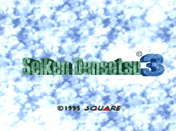


SACNOTH
Following Soukaigi, Kikuta formed his own company, Sacnoth. He received funding from SNK, who would publish the Sacnoth titles upon their release. Kikuta had already decided upon a story, which had been brewing in his imagination for years. The plot of his game would be set precisely one hundred years in the past, centering upon the Nemeton Monastery in Wales. Koudelka Iasant, a young girl with supernatural powers is intuitively drawn to the location and discovers that it is the locus of disturbing magical rituals. The story was inspired by the novel The Name of the Rose by Umberto Eco, and better expressed Kikuta's cultural and historical interests than any of the projects he had embraked upon thus far. For the the gothic horror RPG Koudelka, Kikuta served as scenario writer, producer, and composer. Unfortunately, his intense vision was not enough to carry the title, and its grid-based battle engine proved its weakest link. The diversity of the muscial score suffered due to the composer's responsibilities in overseeing all aspects of the game's development. Remarkably some of his best songs were recorded during the tumultuous development, though unassuming atmospheric pieces round out the whole. With Koudelka's release receiving little popular or critical attention, Kikuta resigned from Sacnoth and set up another more modest development house. He named it Nostrilia.
NOSTRILIA
Kikuta's next project was a short-lived collaboration between PC game developer Softstar and Squaresoft. A 3D MMORPG planned for a release in China called Bukyo, short for Chou Bukyou Taisen (超武侠大戦), Square canceled the project midway into production. Feeling let down by Square once again, Kikuta turned his attention to more independent-minded projects: a novel and an album retrospective called Lost Files. A compilation of his earlier musical pieces, Lost Files reflects the evolution of Hiroki Kikuta's music since the early 1990s. It was not until late 2006 that Hiroki Kikuta's music was again featured in a videogame. Even then, the composer's work appeared without his direct involvement. Rather, several of his compositions from Seiken Densetsu 2 and 3 were chosen as arrangements for the long-awaited next installment in the long-running series. For Dawn of Mana Square composers Tsuyoshi Sekito, Masayoshi Soken, and Junya Nakano offer spirited remixes of Kikuta's original songs, including "Meridian Child," "Splash Hop," and "Don't Hunt the Fairy." The joy that the music staff experienced remixing Kikuta's original tracks might have played a part in Dawn of Mana composer Kenji Ito's decision to Hiroki Kikuta for a collaborative musical project for Square Enix. Kikuta will be composing over ten tracks for the Square Enix MMORPG Concerto Gate, a title that shares many similarities with the abandoned Bukyo project. The game will be released in April of 2007. With Square's newly pledged dedication to retro gaming on the Wii Virtual console, Sony PSP, and Nintendo DS, along with voicing an interest in continuing remakes and direct sequels for the major consoles, the return of Kikuta is more timely than ever. As the prologue to Secret of Mana suggests, "Time flows like a river and history repeats."
Related Articles
The Pioneers: Ted Woolsey
The Pioneers: Yoko Shimomura
The Pioneers: Masashi Hamauzu
The Pioneers: Hitoshi Sakimoto
Pingback
A-note : "Square Haven 菊田裕樹特集"Sources
Square Enix Music, bio,
http://www.squareenixmusic.com/composers/kikuta.html
Spelmusik.net, interview,
http://spelmusik.net/intervjuer/hiroki_kikuta_eng.html
Rocketbaby, interview, http://www.rocketbaby.net/interviews_hiroki_kikuta_1.html
Sakura-Con 2004, write-up
http://www.fansview.com/2004/sakuracon/042304c.htm
Overclocked Remix, Hiroki Kikuta composer,
http://www.ocremix.org/composer/id/8/
Wikipedia entry, Hiroki Kikuta,
http://en.wikipedia.org/wiki/Hiroki_Kikuta
Square Sound, The Hiroki Kikuta <3 Society thread,
http://squaresound.com/forum/archive/index.php/t-3229.html
Copyright © 1998-2025 Square Haven. This material may not be published or rewritten without crediting Square Haven as the author. Terms of Use


